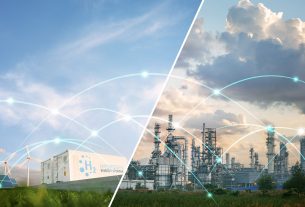EIES23 – The urgency for the European chemical industry is greater than ever, says Marco Mensink, director general of Cefic, the organization of the European chemical industry. ‘We are now expected to become circular, digital, climate neutral by 2040 and we must also get things in order in various dossiers, such as PFAS and nitrogen.
While the focus in the transition is normally on 2050, 2040 is the most important year for the industry. This has everything to do with the deadline for ETS, the European trading system for CO2 rights. Marco Mensink: ‘2040 is the new 2050. ETS credits will leave the system in 2039.’
‘I have never seen challenges greater than now. We are going through a double twin transition.’
The new European Commissioner Hoekstra has also been clear about this. ‘By 2040, CO2 emissions must be reduced by 90 percent. Ninety or one hundred percent, that makes little difference to the industry. No more CO2 credits in 2039 means that CO2 prices will go through the roof in 2036 and that by 2032 it will become very difficult to produce a chemical building block such as ammonia in Europe. If, in addition, the gas price is 4.5 times higher than in the US and we also have to pay the enormous CO2 price on top of that, then we are faced with a gigantic challenge. And then we are also dealing with a very bad economy at the moment. That does not seem to be recovering in 2024. So the first moment that the European chemical industry can focus on investments again is 2025, 2026. And then the United States also has the Inflation Reduction Act.’ hundreds of billions of dollars in, among other things, the greening of the industry. This allows chemical companies to invest in new future-proof factories. “Then the future will come at us like a wall…’
Different picture
Mensink: ‘We should also be happy with the Americans’ Inflation Reduction Act. It is a huge wake-up call for Europe. For a long time we thought that we could make it on our own and that the US was lagging behind us. But the federal government is making 1 trillion dollars available, not half 500 billion as in Europe, but double, as if it is nothing. And actually it’s even more, triple if you count everything. By the way, that’s only half the story. Because everyone there will start engineering and soon building new factories at the same time, the costs for design and materials will rise enormously. That gives a different picture. Which companies will actually complete the projects? It’s all going to be very expensive.’
Right direction
Mensink thinks that Europe has to make choices. ‘We will move from a broad industrial policy to a ‘what-industry-do-we-want-here policy’. If Germany spends 2.8 billion euros on the steel sector in Germany, or invests a lot of money in the arrival of a Tesla battery factory, there will be little money left for anything else. There is simply not enough money to transform the entire industry at once. Right now, the deepest point of the industry crisis, with volume declines of 25 percent, is the momentum to invest in CO2 storage projects such as Porthos, Antwerp@C and, for example, Shell’s electrolyzer on the Maasvlakte. Fortunately, Brussels is currently waking up. I am an optimist, otherwise you wouldn’t have worked here in Brussels for seventeen years. There really seems to be some movement now; we are also really getting an industrial policy. So things are going in the right direction.’
Offshore wind farm
There is also an important task for the industry itself, says Mensink. ‘You have to be at the forefront and also be seen. There are companies in Rotterdam that no one knows. Why would governments or society want to invest money in those companies? Chemical companies have to show themselves much more. Great things are happening. Show that. Tell me. Bring it out! It’s really important to be the first. For example, in the field of electrification.’ He praises, for example, the initiative of BASF Antwerp, which is investing in an offshore wind farm together with Vattenfall, thus ensuring a large quantity of electrons in the future.
EIES2023
During the European Industry and Energy Summit 2023 (EIES23), December 7 and 8 in Antwerp, the industrial transition will be central. This not only concerns the climate challenges, but also the sustainability of industry in Europe. How do we prevent de-industrialization of Europe? Cefic Director Marco Mensink is at that moment at the COP28 climate summit in Dubai. During the opening of EIES23, Mensink will be contacted via Zoom to also stay informed of developments there. Register here for EIES23.





